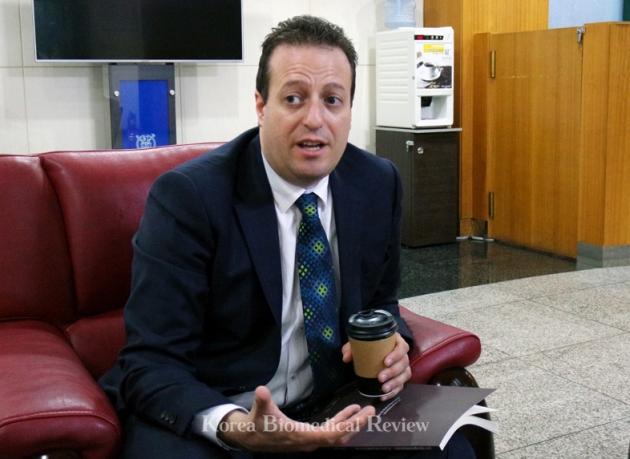Korea is pushing to make the most of the nation’s vast healthcare data to develop its medical the industry. Despite much talk about the ambitious plan, little progress has been made, however.
Jeremy Rassen, chief scientific officer of Aetion, is a leading expert in using medical big data for making decisions on treatments. Aetion has developed an evidence-backed system that analyzes real-world data (RWD) from U.S. clinical and financial interactions in healthcare to provide fast, accurate and transparent real-world evidence (RWE).
Rassen sat down with Korea Biomedical Review on the sidelines of the 20th Korean Society for Pharmacoepidemiology and Risk Management (KoPERM) workshop last Friday, to talk about how to turn RWD into RWE for making decisions on medical treatments.
To understand RWD and RWE, it is essential to know the exact meaning of each term, Rassen said.
"A recent update from the U.S. Food and Drug Administration (FDA) lists RWD as data relating to patient health status and the delivery of healthcare routinely collected from a variety of sources," said Rassen. "RWE is the clinical evidence regarding the usage, and potential benefits or risks, of a medical product derived from analysis of RWD.”

RWD in healthcare, which varies by nation, is vast and is recognized as big data, Ressen added. Such RWD has numerous applications in the field of pharmaceuticals. It can prove secondary implications for certain drugs and find adaptive pathways, which improve timely access for patients to new medicines.
“It has also been used in the area of safety either at the time of drug approval or some point down the road,” Rassen said.
In developing new drugs, RWD can establish the need for the medication and design randomized clinical trials (RCT).
“RWD has a lot of different applications in clinical development, trial design, and planning,” Rassen said. “It can even follow up on a trial after it has ended and continue to follow patients to look at long-term outcomes and effects.”
Although instrumental in supporting the development of new drugs, RWD is not suited for solely developing new drugs on its own as it lacks the amount of RWD needed to provide RWE, however, Rassen pointed out.
Regarding important factors in making decision-relevant evidence, Rassen emphasized four conditions -- meaningful, valid, expedited and transparent.
The meaningful evidence is answering the right question that is most relevant to the decision maker, while valid evidence ensures quality and interpretability. The expedited evidence is to be able to come up with the answers fast the first time, and keep having consistent answers in the future and transparent evidence is to outline the research specifically to decision-makers.
“Although all categories are pertinent in providing solid RWE, the valid evidence is most important as it is the core of making a decision,” Rassen emphasized.
He also expressed interests in the Korean healthcare big data.
“The U.S., in general, has two kinds of healthcare data. Doctors will record their findings and other clinical notes in electronic healthcare record and separately send a claim to the patient’s insurance company,” Rassen said.
Contrast to the U.S., Korea has a very rational healthcare record combined by the Health Insurance Review & Assessment Service (HIRA), which is famous worldwide, Rassen added.
“The pros of having a combined data is enormous as it can answer a real variety of clinical and therapeutic questions such as how different treatment is better for different diseases,” said Rassen. “It can also reduce time as the data is all stored in one place.”
Rassen emphasized that from the businesses’ perspective, they can provide a platform to do research on such data and help researchers work faster with consistent excellent science.
Aetion’s system allows researchers to interact with natural scientific language, which in turn allows the computer to generate the code needed for the analysis.
“The program is also transparent as it reports in natural language. Although the report may be long, it specifies every step of the researcher’s decision to the decision maker,” said Rassen.
If the right question is asked the outcome can be flawless, Rassen added.
In using such data, security is one of the most important issues to keep in mind as private information is highly sensitive, the expert noted.
“Our software is designed exactly for that purpose as security is such a critical part of the regulatory environment and for the patients, too,” he said. “Our company’s software sits next to the data so that the research can ask questions about the data without ever seeing any single patient information.”
Ressen believes that Korea’s healthcare data and the company’s software can create a positive synergy. “My company’s software was designed to work on various healthcare data formats, including Korea,” Rassen said.
Regarding security, the sensitivity of data is a part of the core design, Rassen noted The system could be used on a cloud platform or installed on-site for institutions that have sensitive data, he added.

